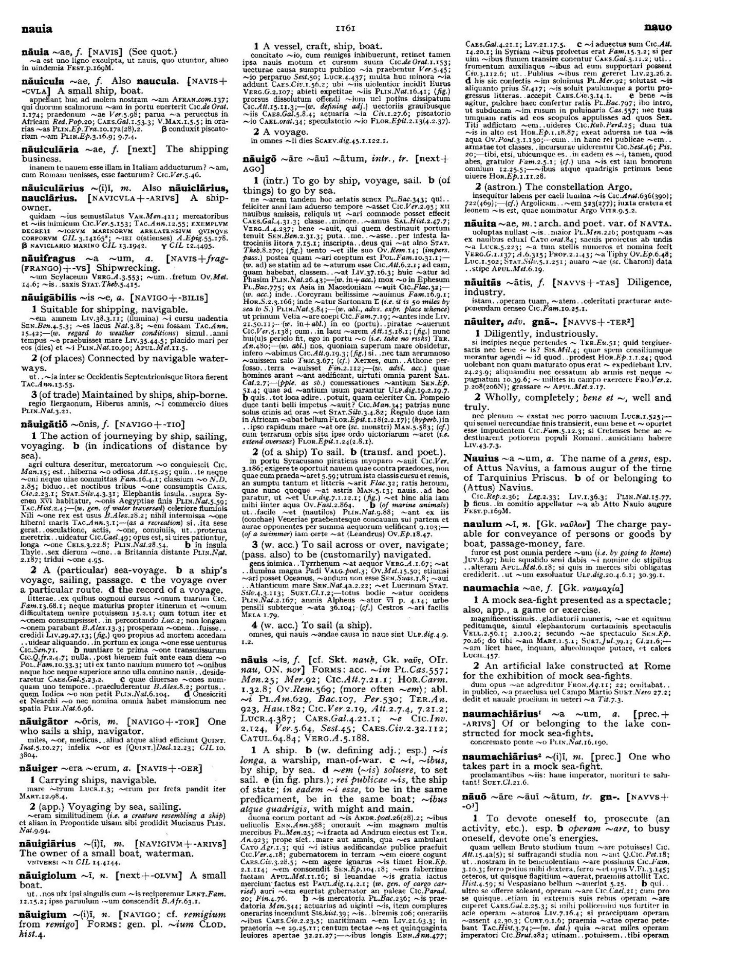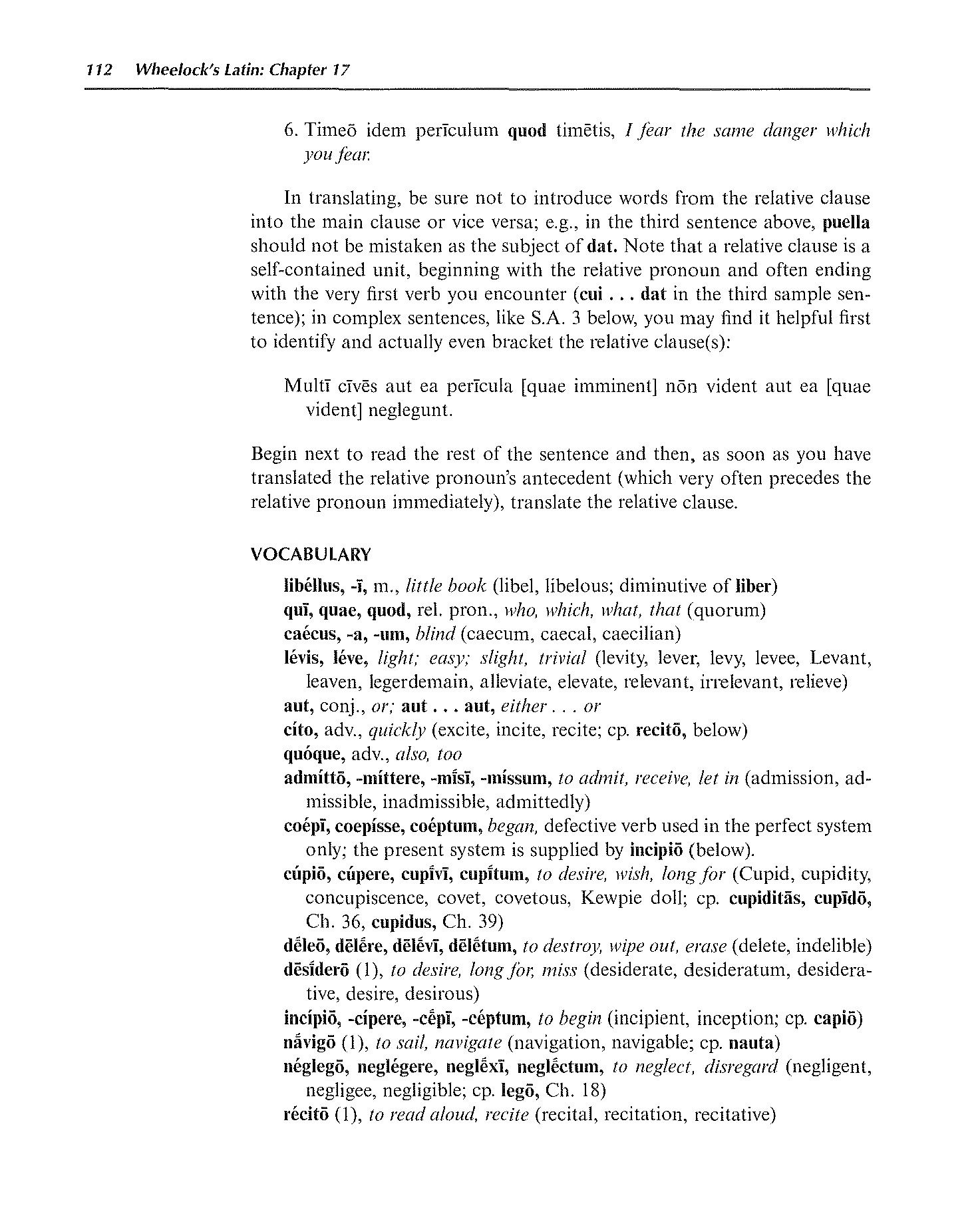
page_listing.tpl
page_subListingDetails.tpl
sub_listingDetails_style1.tpl
sub_listingDetails.title.tpl
nāvigāre to sail
nāvigāre is a Latin Verb that primarily means to sail.
Definitions for nāvigāre
Wheelock's Latin
Verb
- 1
to sail, navigate
English derivatives:
navigation navigable
Oxford Latin Dictionary
Verb
- 1
(intr.) To go by ship, voyage, sail. (b) (of things) to go by sea.
- 2
(of a ship) To sail. (b) (transf. and poet.).
- 3
(w. acc.) To sail across or over, navigate; (pass. also) to be (customarily) navigated.
- 4
(w. acc.) To sail (a ship).
Sentences with nāvigāre
Latin to English
Graecī ā patriā suā ad Italiam navigāvērunt.Compare The Greeks sailed from their own country to Italy.
Dēlum nāvigāvit.Compare He sailed to Delos.
Cum quattuor diēs nāvigāssēmus, subitō maxima tempestās coorta est.Compare When we had sailed four days, suddenly a very great storm arose.
Ego, quoniam superus mare obsideo, inferus navigo.Compare Since the upper sea is shut up, we will sail by the lower.
Insuetos navigo mare timeo.Compare Being unaccustomed to sailing, he feared the sea.
Omnis enim, qui non ignoscitur, etiam qui est, in Africa dico navigo.Compare For all who had not been pardoned, and also all who had, are said to be about to sail to Africa.
Conjugation table for nāvigāre
Cactus2000
| ACTIVE | |
| Indicative present | Indicative imperfect |
| nāvigō nāvigās nāvigat nāvigāmus nāvigātis nāvigant | nāvigābam nāvigābās nāvigābat nāvigābāmus nāvigābātis nāvigābant |
| Indicative perfect | Indicative pluperfect |
| nāvigāvī nāvigāvistī nāvigāvit nāvigāvimus nāvigāvistis nāvigāvērunt / nāvigāvēre | nāvigāveram nāvigāverās nāvigāverat nāvigāverāmus nāvigāverātis nāvigāverant |
| Indicative future | Indicative future perfect |
| nāvigābō nāvigābis nāvigābit nāvigābimus nāvigābitis nāvigābunt | nāvigāverō nāvigāveris nāvigāverit nāvigāverimus nāvigāveritis nāvigāverint |
| Subjunctive present | Subjunctive imperfect |
| nāvigem nāvigēs nāviget nāvigēmus nāvigētis nāvigent | nāvigārem nāvigārēs nāvigāret nāvigārēmus nāvigārētis nāvigārent |
| Subjunctive perfect | Subjunctive pluperfect |
| nāvigāverim nāvigāveris nāvigāverit nāvigāverimus nāvigāveritis nāvigāverint | nāvigāvissem nāvigāvissēs nāvigāvisset nāvigāvissēmus nāvigāvissētis nāvigāvissent |
Infinitive present nāvigāre Infinitive perfect nāvigāvisse Infinitive future nāvigātūrum esse | Imperative present nāvigā nāvigāte Imperative future nāvigātō nāvigātō nāvigātōte nāvigantō |
| Indicative present | Indicative imperfect |
| - - nāvigātur - - - | - - nāvigābātur - - - |
| Indicative perfect | Indicative pluperfect |
| - - nāvigātus est - - - | - - nāvigātus erat - - - |
| Indicative future | Indicative future perfect |
| - - nāvigābitur - - - | - - nāvigātus erit - - - |
| Subjunctive present | Subjunctive imperfect |
| - - nāvigētur - - - | - - nāvigārētur - - - |
| Subjunctive perfect | Subjunctive pluperfect |
| - - nāvigātus sit - - - | - - nāvigātus esset - - - |
Infinitive present nāvigārī Infinitive perfect nāvigātum esse Infinitive future nāvigātum īrī | Imperative present - - Imperative future - nāvigātō - - |
| PARTICIPLE | ||
| Participle present active | ||
| Nom. | nāvigāns | nāvigantēs |
| Gen. | nāvigantis | nāvigantium |
| Dat. | nāvigantī | nāvigantibus |
| Acc. | nāvigantem | nāvigantēs |
| Abl. | nāvigante | nāvigantibus |
| Participle future active | ||
| Nom. | nāvigātūrus | nāvigātūrī |
| Gen. | nāvigātūrī | nāvigātūrōrum |
| Dat. | nāvigātūrō | nāvigātūrīs |
| Acc. | nāvigātūrum | nāvigātūrōs |
| Abl. | nāvigātūrō | nāvigātūrīs |
| Participle perfect passive | ||
| Nom. | nāvigātus | nāvigātī |
| Gen. | nāvigātī | nāvigātōrum |
| Dat. | nāvigātō | nāvigātīs |
| Acc. | nāvigātum | nāvigātōs |
| Abl. | nāvigātō | nāvigātīs |
| Gerundive | ||
| Nom. | nāvigandus | nāvigandī |
| Gen. | nāvigandī | nāvigandōrum |
| Dat. | nāvigandō | nāvigandīs |
| Acc. | nāvigandum | nāvigandōs |
| Abl. | nāvigandō | nāvigandīs |
| Gerund | Supine | |
| Nom. | nāvigāre | nāvigātum |
| Gen. | nāvigandī | nāvigātū |
| Dat. | nāvigandō | |
| Acc. | nāvigandum | |
| Abl. | nāvigandō | |
Data sources
Notes
- Definitions
- Frederick M. Wheelock, Wheelock's Latin, 6th ed., rev. Richard A. LaFleur (New York, NY: HarperCollins Publishers, 2005): 112.
- P. G. W. Glare, Oxford Latin Dictionary, Vols. 1-8 (Oxford: Clarendon Press, 1982): 1161.
- Word frequencies
- Paul B. Diederich, The Frequency of Latin Words and Their Endings, PhD diss., (Columbia University, 1939).
Bibliography
Allen, Joseph H. Allen and Greenough's New Latin Grammar for Schools and Colleges: Founded on Comparative Grammar. Edited by James B. Greenough, George L. Kittredge, Albert A. Howard, and Benjamin L. D'Ooge. Boston, MA: Ginn & Company, 1903.
Crystal, David. A Dictionary of Linguistics and Phonetics. 6th ed. Oxford, UK: Blackwell Publishing, 2008.
Delatte, Louis, Suzanne Govaerts, Joseph Denooz, and Etienne Evrard. Dictionnaire fréquentiel et index inverse de la langue latine [Frequency Dictionary and Inverse Index of the Latin Language]. Liège, Belgium: Laboratoire d'analyse statistique des langues anciennes de l'Université de Liège (L.A.S.L.A.), 1981.
Diederich, Paul B. The Frequency of Latin Words and Their Endings. PhD diss., Columbia University, 1939.
Francese, Christopher. "Latin Core Vocabulary." Dickinson College Commentaries. Last modified 2014. http://dcc.dickinson.edu/latin-vocabulary-list.
Gildersleeve, Basil L., and Gonzales Lodge. Gildersleeve's Latin Grammar: Third Edition, Revised, and Enlarged. 3rd ed. London, England: Macmillan and Co., 1903.
Glare, Peter G.W. Oxford Latin Dictionary. Vols. 1-8. Oxford, England: Clarendon Press, 1982.
Krüger, Bernd. "Latin Conjugation Tables." Cactus2000. Accessed May 5, 2023. https://latin.cactus2000.de/index.en.php.
Pierson, Nick. "Sound of Text." Accessed October 26, 2019. https://soundoftext.com.
Wheelock, Frederick M. Wheelock's Latin. 6th ed. Revised by Richard A. LaFleur. New York, NY: HarperCollins Publishers, 2005.
Wiktionary Contributors. "Victionarium." Wikimedia Foundation, Inc. Updated March 18, 2019. https://la.wiktionary.org/wiki/Victionarium:Pagina_prima.
Citation
Chicago (17th ed.)
Allo Contributors. "nāvigō, nāvigāre, nāvigāvī, nāvigātum (v.) - Latin Word Definition." Allo Latin Dictionary. Last modified . Accessed February 19, 2026. http://ancientlanguages.org/latin/dictionary/navigo-navigare-navigavi-navigatum.
Entry created on . Last updated on .







